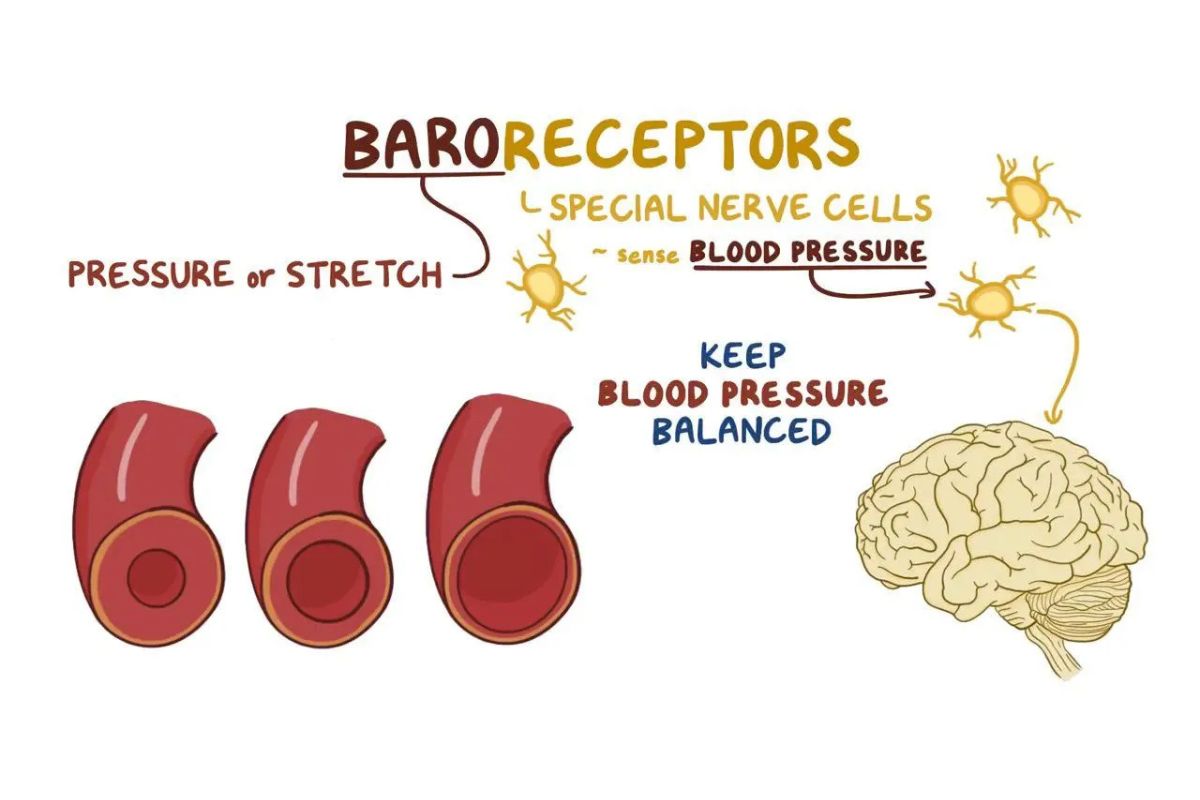
Baroreceptors play a crucial role in regulating blood pressure. These specialized nerve endings, located in the walls of blood vessels, detect changes in blood pressure and send signals to the brain to maintain stability. Baroreceptors are found primarily in the carotid sinuses and aortic arch. When blood pressure rises, these receptors stretch and send signals to the brain to lower heart rate and dilate blood vessels. Conversely, when blood pressure drops, they trigger mechanisms to increase heart rate and constrict vessels. Understanding baroreceptors helps in managing conditions like hypertension and heart disease. Let's dive into 27 fascinating facts about these vital components of our circulatory system.
What Are Baroreceptors?
Baroreceptors are specialized nerve cells that detect changes in blood pressure. They play a crucial role in maintaining cardiovascular stability by sending signals to the brain to adjust heart rate and blood vessel diameter. Let's dive into some fascinating facts about these tiny yet mighty sensors.
-
Baroreceptors are located in the walls of blood vessels, primarily in the carotid sinuses and aortic arch.
-
They detect the stretch of the blood vessel walls, which indicates changes in blood pressure.
-
When blood pressure rises, baroreceptors send signals to the brain to lower heart rate and dilate blood vessels.
-
Conversely, when blood pressure drops, baroreceptors signal the brain to increase heart rate and constrict blood vessels.
How Do Baroreceptors Work?
Understanding the mechanism behind baroreceptors can shed light on their importance in the body. They operate through a feedback loop involving the nervous system.
-
Baroreceptors communicate with the brain via the glossopharyngeal and vagus nerves.
-
The signals sent by baroreceptors are processed in the medulla oblongata, a part of the brainstem.
-
This feedback loop helps maintain blood pressure within a narrow, healthy range.
-
Baroreceptors can adapt to sustained changes in blood pressure, a process known as resetting.
Baroreceptor Reflex
The baroreceptor reflex is a rapid response mechanism that helps stabilize blood pressure. This reflex is vital for everyday activities and sudden changes in posture.
-
The baroreceptor reflex can adjust blood pressure within seconds.
-
It is essential for preventing fainting when standing up quickly.
-
The reflex involves both the sympathetic and parasympathetic nervous systems.
-
Sympathetic activation increases heart rate and constricts blood vessels, while parasympathetic activation does the opposite.
Clinical Significance of Baroreceptors
Baroreceptors are not just fascinating from a biological standpoint; they also have significant clinical implications. Their function or dysfunction can impact health in various ways.
-
Dysfunctional baroreceptors can lead to conditions like orthostatic hypotension, where blood pressure drops upon standing.
-
Baroreceptor sensitivity decreases with age, contributing to higher blood pressure in older adults.
-
Certain medications can affect baroreceptor function, either enhancing or inhibiting their activity.
-
Baroreceptor activation therapy is an emerging treatment for resistant hypertension.
Baroreceptors in Research
Ongoing research continues to uncover new insights about baroreceptors and their role in health and disease. These studies are crucial for developing new treatments and understanding cardiovascular health.
-
Researchers are exploring how baroreceptors interact with other sensory systems in the body.
-
Studies are investigating the genetic factors that influence baroreceptor function.
-
Animal models are often used to study baroreceptor mechanisms and their impact on blood pressure regulation.
-
Advances in imaging technology are helping scientists visualize baroreceptor activity in real-time.
Fun Facts About Baroreceptors
Beyond their critical role in health, baroreceptors have some intriguing and lesser-known aspects that highlight their complexity and adaptability.
-
Baroreceptors can also respond to changes in blood volume, not just pressure.
-
They are more sensitive to rapid changes in blood pressure than to gradual changes.
-
Baroreceptors can be found in other animals, including fish and amphibians, indicating their evolutionary importance.
-
The term "baroreceptor" comes from the Greek word "baros," meaning weight or pressure.
-
Baroreceptors work in tandem with chemoreceptors, which detect changes in blood chemistry like oxygen and carbon dioxide levels.
-
Some people have naturally higher or lower baroreceptor sensitivity, which can affect their blood pressure regulation.
-
Baroreceptor research has led to the development of new medical devices, such as implantable sensors that monitor blood pressure continuously.
The Final Word on Baroreceptors
Baroreceptors play a crucial role in maintaining blood pressure stability. These specialized nerve endings detect changes in blood pressure and send signals to the brain, which then adjusts heart rate and blood vessel diameter. This process ensures that organs receive a steady supply of blood and oxygen.
Understanding baroreceptors helps in grasping how the body maintains homeostasis. They’re vital for responding to sudden changes, like standing up quickly or experiencing stress. Without them, our bodies would struggle to adapt to these shifts, leading to dizziness or fainting.
Research continues to uncover more about these fascinating sensors, offering potential insights into treating conditions like hypertension. So, next time you feel lightheaded after standing up too fast, remember those tiny baroreceptors working hard to keep you balanced. They might be small, but their impact on your health is enormous.
Was this page helpful?
Our commitment to delivering trustworthy and engaging content is at the heart of what we do. Each fact on our site is contributed by real users like you, bringing a wealth of diverse insights and information. To ensure the highest standards of accuracy and reliability, our dedicated editors meticulously review each submission. This process guarantees that the facts we share are not only fascinating but also credible. Trust in our commitment to quality and authenticity as you explore and learn with us.
